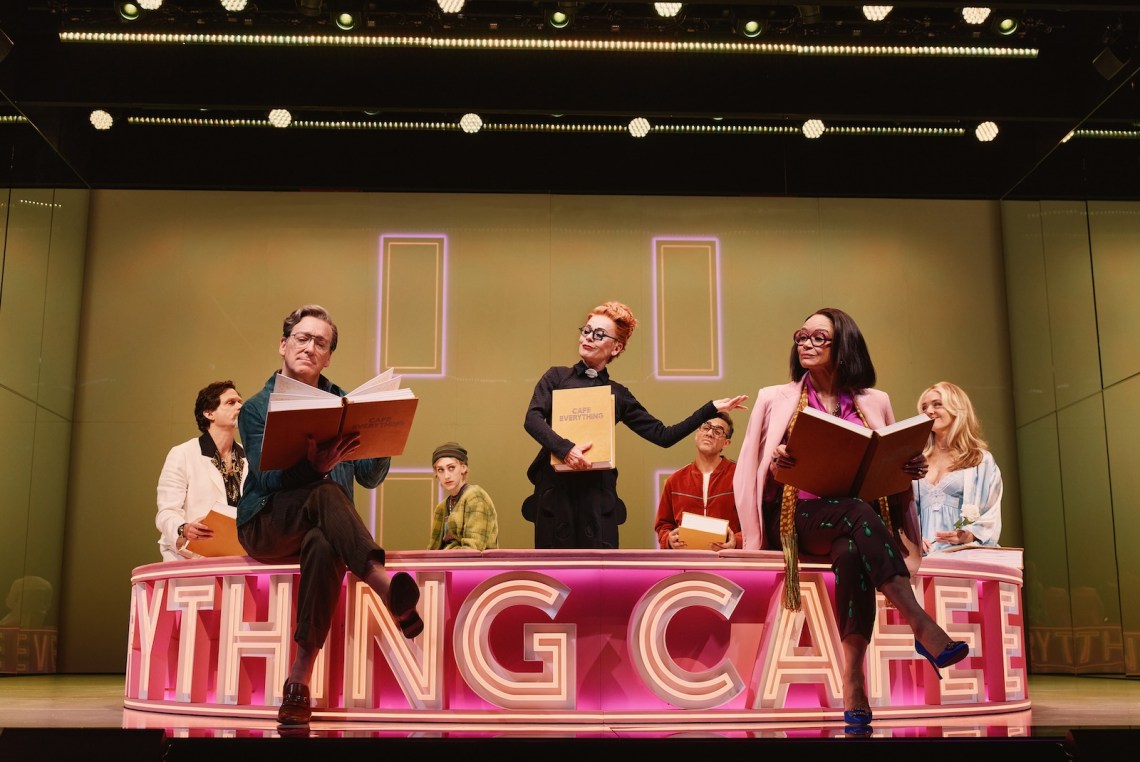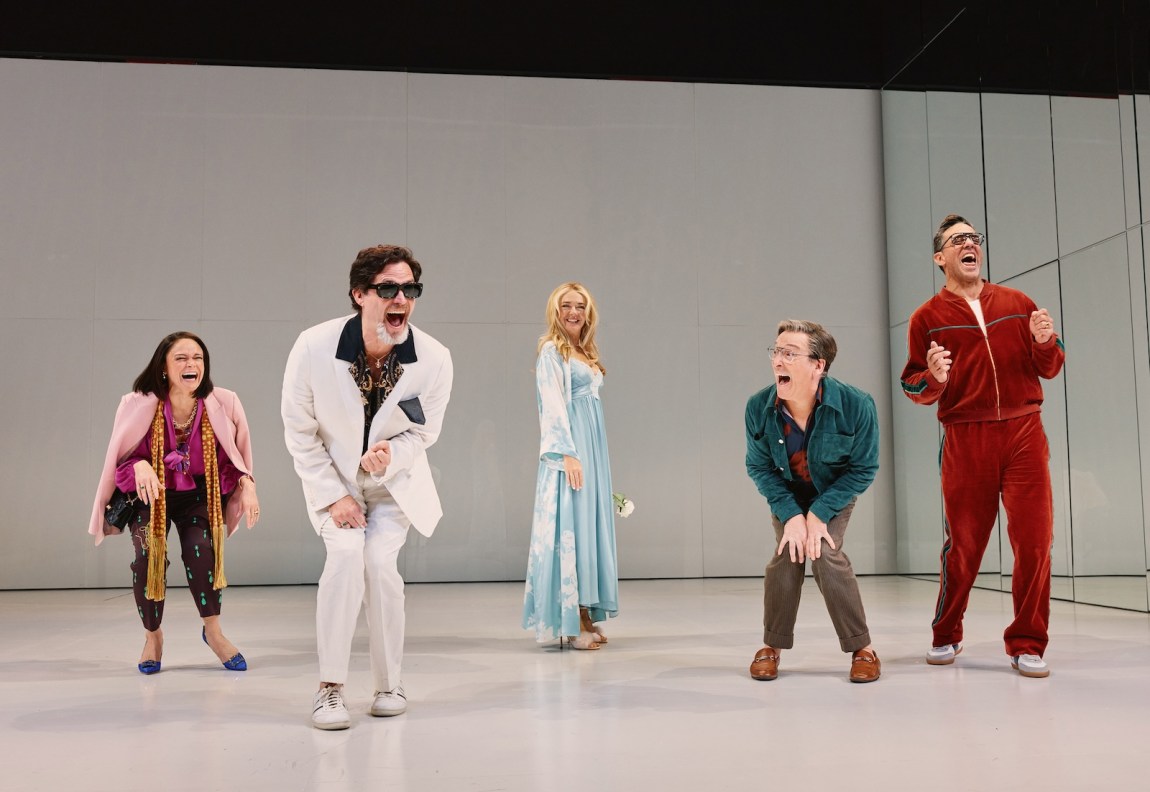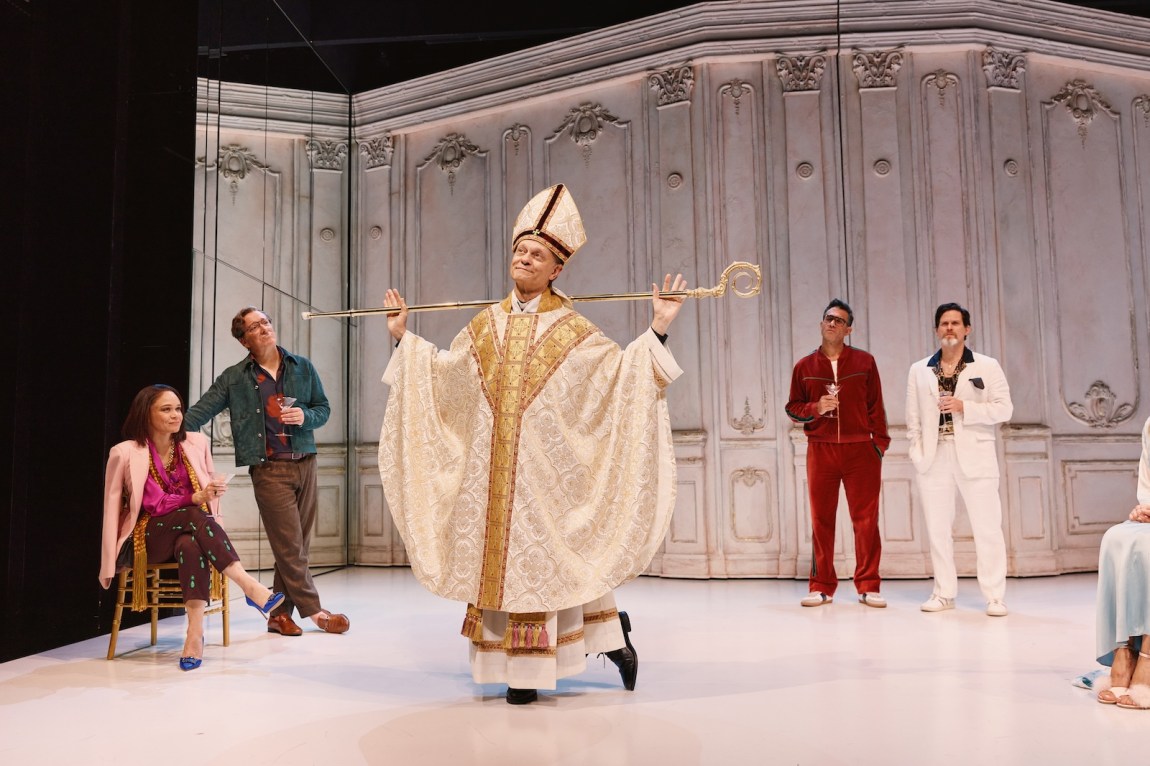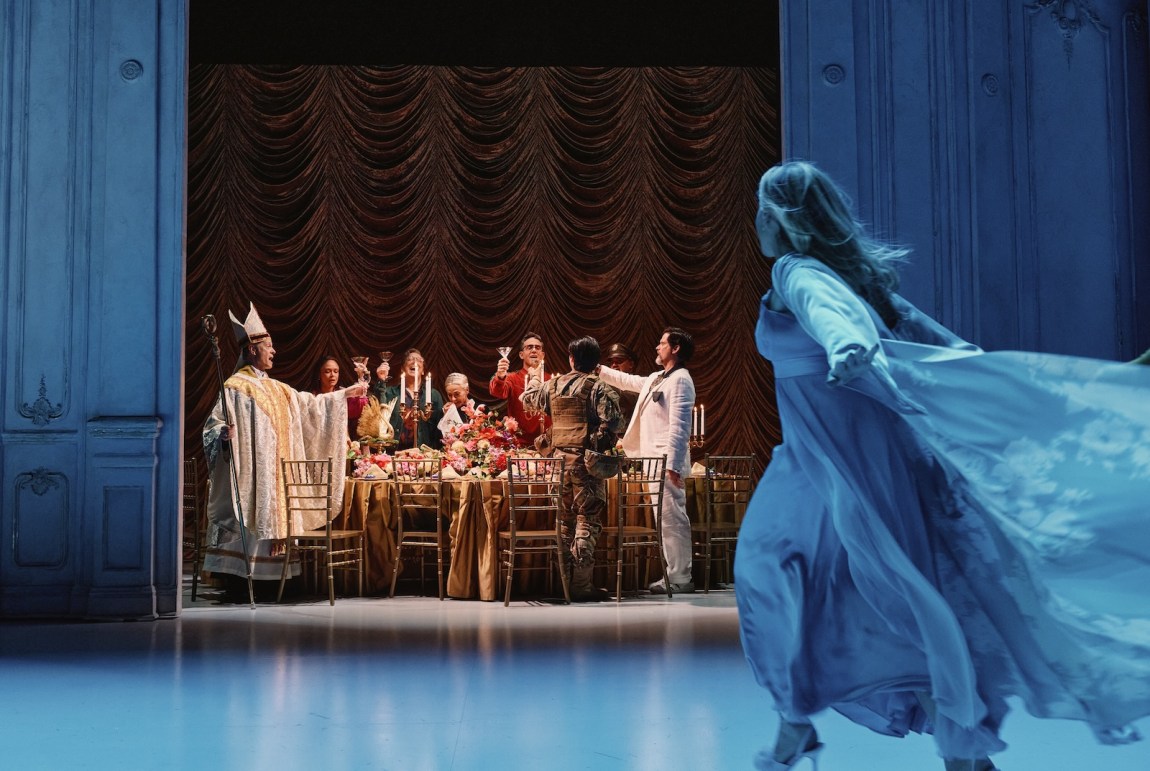Before Stephen Sondheim learned to read, he could identify records from his household collection by the particular shapes of the words on their spines. At parties in his family’s handsome Central Park West apartment, his biographer Meryle Secrest writes, “his parents would trot him out in the evenings to demonstrate this parlor trick” for the arty and ambitious circles they mingled with. Imagine the splendid living room ringing with genteel applause, like the clinking of martini glasses that never overspill: already Sondheim was delighting crowds with performances poised at the juncture where music and words meet.
Reading, however, never became a great pursuit for the prodigious composer and lyricist, who brought a new set of themes to the forefront of musical theater: loneliness, ambivalence, aging, the process of making art, and remaining single well into one’s thirties. One of Sondheim’s most brilliant and experimental musicals, Sunday in the Park with George (1984), deals in its first act with the life of the pointillist painter Georges Seurat and the creation of his masterpiece A Sunday Afternoon on the Island of La Grande Jatte, then gallops forward in its second half to the painter’s legacy in the 1980s. Assassins (1991), a revue of successful and would-be killers of American presidents, features John Hinckley Jr. and Lynette Fromme singing “Unworthy of Your Love,” which assumes the guise of a sweet duet (the kind typically sung by lovers to each other), but is in fact addressed to the public figures they’re violently obsessed with—Jodie Foster and Charles Manson. Sondheim was always keener on mixing bitterness with affection than uniting two besotted people. In Company (1970), his signature musical about a chronic bachelor named Bobby, the protagonist’s settled friend Joanne—she of the brassy demeanor and tedious husband—sings,
It’s the little things you share together,
swear together,
wear together,
that make perfect relationships.
The concerts you enjoy together,
neighbors you annoy together,
children you destroy together,
that keep marriage intact.
All of these subjects were more closely associated with the novel than with musical theater when Sondheim got his start. But he mostly abstained from reading fiction and poetry, although he did enjoy plays and the occasional detective story, since he loved, in addition to parlor tricks, puzzles of every form. In interviews he attributed his scant engagement with novels to slow reading speed and a short attention span. There were too many words in novels, and not all of them judiciously chosen, whereas for the lyricist every word must matter, but unobtrusively. As Secrest writes, he learned early on from his mentor Oscar Hammerstein “that lyrics must not overtax the ear.” Sondheim’s shelves were packed with foreign dictionaries in Romance languages, Oxford Companions to American and English Literature, rhyming dictionaries, and reference books for “quotations, proverbs, slang and modern English usage, acronyms, initialisms and abbreviations.” All the tiny, irregular puzzle pieces awaiting unity.
Rather than literature, the art form that had the greatest impact on Sondheim, from a young age, was film. His knowledge was encyclopedic, especially of studio movies from the 1940s and 1950s. According to Secrest, he was only able to recall the date of his mother’s wedding to her second husband because it coincided with the day All About Eve opened at the Roxy. He would have been eighteen at the time and his mother, “Foxy,” was a Joan Crawford type with well-tailored appeal and a tendency toward sadism.
Sondheim welcomed success early, having written the lyrics for West Side Story (1957) in his mid-twenties. (His comedic hit A Funny Thing Happened on the Way to the Forum, which he composed and lyricized, opened on Broadway five years later.) That success brought him into casual acquaintance with the silver screen glamour he’d long idolized. His neighbor in the building where he bought an apartment after his first wave of triumphs was Katharine Hepburn, and he kept a piano in a soundproofed room upstairs lest the noise bother her. He once dined with Grace Kelly and later privately faulted her for holding the menu too close to her face. He and his high society friends sometimes played “Stardom,” a boardgame he invented in which, he said, wannabe actors “fuck [their] way to the top.” Now he’d become the proverbial glass-clinker in the proverbial room, or the parties were held in his honor.
*
For the last several years of his life, as his health gradually declined, Sondheim worked, with a great deal of frustration, on a musical based on two films by the Spanish surrealist Luis Buñuel: The Discreet Charm of the Bourgeoisie (1972), about a group of wealthy friends failing to find a restaurant that will serve them, and The Exterminating Angel (1962), in which guests of a similar milieu find it existentially impossible to leave the dinner party they’ve attended. The resulting show, Here We Are, opened earlier this fall at The Shed, in a room that in many ways reflects the tastes of the upper classes today: high above the ground, with a view facing inward. To get there I passed an enormous new Spanish restaurant with fancy food-court airs and a cafe for cycling enthusiasts where an after-hours drinking event was underway. Nestled within the phony corridors of Hudson Yards, both establishments looked more like concepts than places, and prepared me well—maybe too well—for the first act of Here We Are, which recounts its six protagonists’ many failed attempts at fine dining.
Advertisement
The butler and maid have been polishing the minimalist, mirrored set for fifteen minutes when the brunch guests start arriving at the home of Leo and Marianne Brink, and the musical begins in earnest. Leo (Bobby Cannavale) is a rude arriviste who’s made a fortune itemizing credit derivatives, whatever that means; his ditzy, kind wife Marianne (Rachel Bay Jones) takes immense pleasure in the cadence of words like “soupçon” and “huevos rancheros.” Claudia (Amber Gray) “represent[s] a major entertainment entity” and wears her haughty girl-boss blazer draped over her shoulders like an ermine cape.
Her husband, Paul (Jeremy Shamos), is a plastic surgeon celebrating his thousandth nose job and a drug trafficker in cahoots with Leo and another guest, Raffael Santello Di Santicci (Steven Pasquale), who bears the farcical title Ambassador of Moranda as cover for his nefarious purposes. The crew is rounded out by Marianne’s sister Fritz (Michaela Diamond), who is hellbent on bringing about the end of capitalism, unless it involves dipping into her trust fund. Each represents a certain kind of wealthy hedonist, dressed in a colorful costume that never changes (red velour tracksuit, blue silk nightie, and so on), like cartoon characters that turn up for every episode unfazed and unaffected by their pasts. They are concept people, soon to be dining out at concept restaurants.
After arriving, the Brinks’ guests are disappointed to learn that they weren’t expected for brunch at all, but their hosts insist they pile inside the car and head to Cafe Everything, whose preposterously thick menus are like War and Peace for hungry people. There, the waiter (played with excellent, upsetting panache by Denis O’Hare) systematically tells each of them, in song, that they are out of whatever it is they want. “We have no Coke,/we have no Sprite,/we have no Mountain Dew,/no Fresca Lite.” From one unsatisfactory bruncherie to the next, there’s a lot of elaborate ordering, occasionally punctured by Fritz’s insurrectionary remarks and clandestine phone calls with a mysterious anticapitalist cell.
O’Hare plays all the male attendants and Tracie Bennett plays all the female ones, including the server at a French haute cuisine restaurant where everything “is what it is.” At yet another restaurant—Italian—Colonel Martin (Francois Battiste) shows up with his Lieutenant (Jin Ha), claiming to have traced the leaders of a drug smuggling conspiracy to this very joint, which seems to contain only drug smugglers and their spouses. Certainly no food. But this is an absurdist comedy in which anyone might casually be nudged off course, so the military officials pause their mission and join their suspects in search of gustatory delights.
Between these scenes the main characters travel with inscrutable purpose around a luminous white stage, posing and huddling at calculated distances from one another like chess pieces moving through a void. They mostly sing about the beauty of the day, dining out, and, in the case of Fritz, everyone else’s hypocrisy:
Marianne: What is happening to decent restaurants?
Leo: If it isn’t the food it’s the service.
Fritz: Didn’t you hear?
Rafael: If it isn’t the noise it’s the queue.
Fritz: Are you insane?!
Paul: Or the backs of the chairs.
Leo: Or a waiter with airs.
Claudia: Or the long flight of stairs to the loo.
Eventually they arrive at what is to be the location of the second act (the one they can’t leave, the “Here” in “Here We Are”), the Morandan Embassy, where David Hyde Pierce enters, playing a bishop with a shoe fetish who would like any other job, please, and delivers the most winning number of the evening: “Wouldn’t anybody like to have their windows washed? Their sinks repaired? Their faith restored?” No, no, and no.
Advertisement
In fact, Fritz has already procured funding for all the ammunition her comrades need to bring about the end of the world, and Raffael’s butler, Windsor, is unmasked as Inferno (O’Hare again), a resentful leader of the revolution. The first act concludes with the sounds of explosions and great flashes of light. When the second act begins the ensemble is still at the embassy, in a living room furnished with bookshelves, cushioned chairs, and a chaise-longue. They find, of course, that they cannot leave. Also that the food supply is scarce, and their cellphones are dead.
*
Despite promising beginnings, Here We Are increasingly seems to become one with the stuffy, expensive rooms it emanated from. It is all surfaces, but they don’t connect much, and no larger achievement takes shape. To draw a metaphor from Sunday in the Park with George, this is pointillism without enough points, so that the end product looks less like Seurat and more like the Damien Hirst spots that adorn the Brinks’ glaringly white walls. The upstairs-downstairs drama never really delivers a coherent critique or absorbing storytelling the way it does in A Little Night Music (1973), Sweeney Todd (1979), or Assassins. Subplots are broached like the daily specials and abandoned in various states of warming up. Raffael is having an affair with Claudia and eager to get with Marianne, who nonchalantly rebuffs him. Coincidentally, Leo murdered Colonel Martin’s father, way back when. Marianne is trying to remember the thing she was supposed to do today. The world is ending.
Buñuel’s films are themselves meandering satires, but I’m tempted to attribute at least some of the show’s diffuseness to the fact that Sondheim didn’t finish it. In several of his final interviews, he said that the second act remained a work-in-progress, and it was giving him trouble. The show’s production team has said that Sondheim gave them permission to go ahead with the project anyway, two months before he died, in 2021. David Ives wrote the book and Joe Mantello signed on to direct. Sondheim’s frequent collaborator James Lapine told The New York Times in September, “I really trust David and Joe, and don’t think they would be putting up something they didn’t feel was finished.”
Nevertheless, whatever trouble Sondheim thought he was having is reflected in the show itself. The second act contains only two musical numbers and quickly peters out into platitudes that capture neither the contempt of Buñuel’s films nor, as Helen Shaw has pointed out, the exquisite ambivalence one expects of Sondheim. “What we are putting on stage now is as finished as any production about to play its first preview,” the production team told the Times. “It’s ready for audiences, and very much the musical Steve envisioned.” But it seems unnecessary, and a little dubious, for anyone to claim the piece in its current instantiation is finished—or could ever be finished in Sondheim’s absence. I can’t fault the team for doing their best to punch up skimpy material; still, I found myself wishing the production had explored the show’s lack of completion rather than politely ignore it.
As it is, the actors are bold, the set is easy on the eyes, the music is jaunty, and the moral is something something life goes on. Until it doesn’t. Life is a cosmic hors d’oeuvre and art is a flattering commodity hung in a gilded frame. The moments in the show’s second act that best reflect Sondheim’s sensibility, whether or not they originated with him, are those of irreverent philistinism, like when Marianne sings, “All these books/all these polished leather books/I don’t mean to read/no no not to read/no I mean the way it looks.”
In one of the final scenes set in the room, we find Marianne alongside the bishop, who is contentedly munching on some pages from A Tale of Two Cities. It’s been a while since they had decent food to eat, but neither seems particularly worried about it. It’s Marianne’s birthday! A light dusting of snow filters down through a crack in the ceiling. The pair of de facto prisoners regard these falling flakes as a kind of miracle, a sign that goodness and hope are still possible in a ruined world. To me they looked more like all the little irregular pieces that stay swirling about for some time in the aftermath of an awe-inspiring storm.






